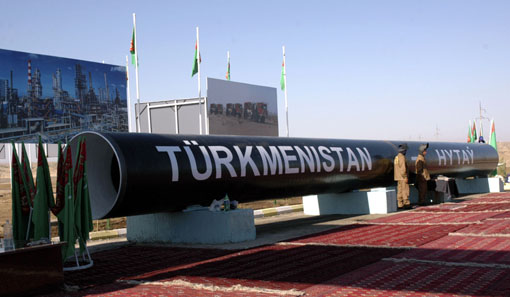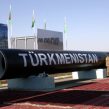
Turkmenistan Demonstrates Commitment To Trans-Caspian Gas Pipeline
Publication: Eurasia Daily Monitor Volume: 8 Issue: 46
By:

Turkmenistan is developing the environmental and legal cases for construction of a trans-Caspian gas pipeline to Azerbaijan, there to link up with the EU-backed Southern Gas Corridor to Europe. While Russia and Iran oppose trans-Caspian pipelines, ostensibly on ecological and legal grounds, Ashgabat has started making the affirmative case. Concurrently, Turkmenistan is has launched construction of the East-West pipeline across its own territory, to connect its onshore gas fields with the Caspian coast. Ashgabat has also opened talks with international companies for service contracts to develop Turkmenistan’s onshore gas fields (production-sharing contracts being limited to the offshore).
On March 1 in Ashgabat, the Turkmen government hosted an international conference on “Environmental Aspects of Trans-Caspian Pipelines.” The government initiated the conference to advance a detailed ecological case in favor of laying a gas pipeline on the seabed to Azerbaijan. Representatives of Turkmenistan and international energy companies argued that seabed pipelines are safer, as well as more environment-friendly, compared with any mode of gas transportation, whether onshore or offshore. In Azerbaijan’s offshore sector alone, oil and gas pipelines with a total length of some 3,000 kilometers have been added by international companies during the last 15 years and are operating safely. Participants also cited Russia’s own construction of cross-border gas pipelines on the seabed of the Baltic and Black Sea. The case for trans-Caspian pipelines in international law was also highlighted at the Ashgabat conference.
The event was unprecedented for Turkmenistan, and state media coverage of the event emphasized Turkmen and European interests in linking up through gas pipelines. Azerbaijan’s Minister of Ecology and Natural Resources, Huseingulu Bagirov, noted “both countries’ tremendous potential and desire to become part of the Southern Corridor” (www.turkmenistan.ru, TDH [Turkmen State News Agency], Neytralni Turkmenistan, Trend Capital, March 1, 2; News Central Asia, March 6).
On March 3-4, the Turkmen government held a promotional event in Singapore on Turkmenistan’s gas development and export policy. The venue had seemed chosen to emphasize Turkmenistan’s export potential to Asian markets (pipeline to China, proposed Turkmenistan-Afghanistan-Pakistan-India [TAPI]). Nevertheless, Turkmen President Gurbanguly Berdimuhamedov’s message to the participants singled out the European option: “Turkmenistan intends to cooperate with European countries through construction of trans-Caspian pipelines. Fruitful discussions with the EU for export of Turkmen gas to Europe have given a powerful impetus to this project.” Berdimuhamedov also cited the conclusions of the Ashgabat environmental conference as a first step toward implementing that project (TDH, www.turkmenistan.ru, March 4, 5).
This level of commitment is unprecedented, but not surprising. It caps a series of steps by Berdimuhamedov in recent months, the public and explicit character of which contrasts with Ashgabat’s traditional caution. Turkmenistan had long taken the position that it sells its gas at the border, without becoming involved in debates about pipelines. In recent months, however, Berdimuhamedov has become proactive in supporting a trans-Caspian pipeline to link up with the Southern Corridor to Europe.
Thus, in July 2010, the Turkmen president for the first time publicly linked the construction of the Turkmen East-West pipeline with the trans-Caspian project and with the planned Nabucco pipeline. In November 2010, at the Caspian summit in Baku, Berdimuhamedov openly contradicted Russian President Dmitry Medvedev’s claim that trans-Caspian pipelines would require the consent of all riparian countries (i.e., a Russian and Iranian veto). Berdimuhamedov retorted that trans-Caspian pipelines only require the consent of two countries whose seabed sectors would be traversed by such pipelines –in this case, Turkmenistan and Azerbaijan. With this, Turkmenistan joined the position long held by Azerbaijan. Both countries as well as the EU defend this position on legal, not political, grounds. At that same Baku summit, Berdimuhamedov indicated for the first time that pipeline projects should be de-coupled from the issue of border delimitation between Turkmenistan and Azerbaijan.
The Turkmen president firmed up all those positions with the European Commission President, Jose Manuel Barroso, and Energy Commissioner, Guenther Oettinger, in January in Ashgabat. The visiting officials assured Berdimuhamedov of the “EU’s full political support for such a pipeline” (EDM, January 11, 19, 20). By now, the United States has also been able to nominate (though not yet confirm) a full ambassador to Turkmenistan, after a four-year hiatus.
Berdimuhamedov’s message to the March 3-4 conference referenced the planned construction of the East-West pipeline across Turkmenistan, without going into specifics. Planning assumptions involve 30 billion cubic meters (bcm) of onshore gas annually from Eastern fields, and another 10 bcm of offshore gas annually, to be fed via a trans-Caspian pipeline into the Southern Corridor to Europe. The Turkmen East-West overland line is expected to be completed by 2015. According to the latest official reports, the first 13 kilometers of this pipeline have been welded thus far (News Central Asia, February 27).
The trans-Caspian pipeline, should it materialize, would become Turkmenistan’s fourth export option chronologically (after the existing pipelines to Russia, Iran, and China), but possibly the most attractive economically by targeting the European market. This necessitates an outlet through the Nabucco pipeline, whose planned capacity of 31 bcm per year can accommodate the available volumes of Turkmen gas. The Southern Corridor’s other proposed lines, ITGI and TAP, at 10 bcm per year for each, and counting on Azerbaijani gas, lack capacity for any significant Turkmen volumes. If launched ahead of Nabucco, either of the two small lines would preempt available volumes of Azerbaijani gas, delaying Nabucco and bottling up Turkmenistan.




